Programmed and Projected by Julian Antos, Becca Hall, Rebecca Lyon, Kyle Westphal, and Cameron Worden.
Our screenings are held at multiple venues around Chicago, including:
- The Auditorium at Northeastern Illinois University (Building E) – 3701 W. Bryn Mawr Ave., Chicago, IL 60625
Tickets: General Admission: $5 • NEIU Students: $2
- The Music Box Theatre – 3733 N. Southport Ave., Chicago, IL 60613
Tickets: General Admission: $7
Monday, September 4 @ 7:00 PM / Music Box Theatre
SÉRIE NOIRE
Directed by Alain Corneau • 1979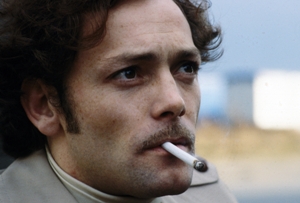
In French with English subtitles
What do you get when French avant-garde novelist Georges Perec (La disparition, a 300-page book without the letter ‘e’) adapts a work of red-blooded American crime literature like Jim Thompson’s A Hell of a Woman? From one angle Alain Corneau’s Série noire, named for an infamous series of French paperback pulps, is simply an exemplary neo-noir — but that’s almost too timid. With its archetypally spare characters cruising through a brutalist concrete landscape, this movie is proudly post-noir, post-punk, post-everything. Patrick Dewære (Hôtel des Amériques, Préparez vos mouchoirs) stars as hapless door-to-door salesman Franck Poupart, just the type of schmuck to be drawn into a murder plot by an old widow’s mute niece (Marie Trintignant). “Without a second thought,” writes Pacific Film Archive curator emeritus Steve Seid, “you buy his worn-out, deranged lowlife toying with oblivion.” In an era when classic American crime fiction was being re-interpreted as a haven for ex-hippies and burnt-out head shop denizens, this Transatlantic translation is surprisingly faithful to the spirit of the original. (KW)
111 min • Prospectacle/Gaumont • 35mm from Institut français, Permission Rialto Pictures
Film Stock: Kodak 2383 (2000)
Special thanks to the Cultural Services of the French Embassy in New York
Preceded by: Trailer Reel: ’70s Neo-Noir and Not-Noir
Wednesday, September 6 @ 7:30 PM / NEIU
AUTUMN LEAVES
Directed by Robert Aldrich • 1956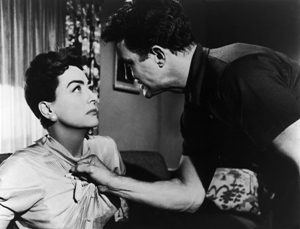
Robert Aldrich’s iconic noir Kiss Me Deadly ends with an atomic detonation, so it’s only appropriate that his masterfully stark follow-up, Autumn Leaves, feels chilly as nuclear winter. Los Angeles has never looked so empty on screen, a succession of sad little bungalows and grocery stores inhabited by damaged people like Joan Crawford’s spinster stenographer Milly Weatherby, who counts her landlady (Ruth Donnelly) as her only friend. So Milly is especially vulnerable when Burt (Cliff Robertson), a smooth-talking young man with a defensive cloak of overconfidence, shares a booth with her at their local watering hole one night. Milly urges Burt to pursue women closer to his own age, but within a month the puppy dog is back on bended knee. Is her sensitive boy a cynical con artist, a heaven-sent lover, a deeply traumatized soul, or some combination of the three? Lurid but never without emotional nuance, Autumn Leaves offers Crawford the finest role of her career. After so many grandiloquent movies that treat Crawford’s everyday travails as world-historic catastrophes, Autumn Leaves plays like a bucket of cold water, a weepie thoroughly grounded in the loneliness of working class life. (KW)
107 min • Columbia Pictures • 35mm from Sony Pictures Repertory
Film Stock: AGFA Lab: Technicolor
Cartoon: Mr. Magoo in “Destination Magoo” (Pete Burness, 1954) – 35mm IB Tech – 7 min
Introduced by Ben Sachs, Chicago Reader and Cine-File Chicago contributor
Wednesday, September 13 @ 7:30 PM / NEIU
THE TEXAS CHAINSAW MASSACRE 2
Directed by Tobe Hooper • 1986
A decade-plus-removed diptych predicated 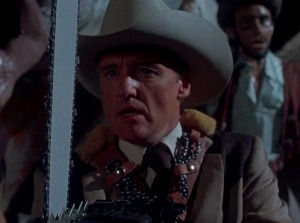 on the sublime spectacle of big men engaged in landscaping equipment balletics, Tobe Hooper’s two Chainsaw Massacre entries stand as perhaps the most audacious, subversive American franchise horror films of the late 20th century, blood-and-filth-caked dispatches from a country in which mechanized death has run rampant. Shedding the arty cubism and lizard-brain terror of his landmark 1974 original, Hooper opted to emphasize the bad taste comedy of his scenario for its Reagan-era, Cannon Group-financed follow-up, calling on fellow Texan L. M. Kit Carson (who had just prior worked on screenplays for Paris, Texas and the 1983 Breathless remake) for a script that sharpened the original’s jaundiced take on family life in the era of industrial capitalism and came packed with some of the funniest, most quotable dialog of the ’80s (“Look what you did to my Sonny Bono wig!”). Dennis Hopper (who later in the year would go on to give career-defining comeback performances in River’s Edge, Blue Velvet, and Hoosiers) takes the lead this time around as Lefty, a disgraced Texas Ranger on the trail of the original film’s central chainsaw-massacring cannibal family, who have monetized their hobby of murdering, cooking, and eating young people by opening a lucrative catering business. Dressed up with squicky effects work courtesy of Tom Savini and production design to rival Blade Runner for massive, alien beauty, The Texas Chainsaw Massacre 2 plays like a Marx Brothers comedy in an abattoir, choking out laughs amidst the viscera. (CW)
on the sublime spectacle of big men engaged in landscaping equipment balletics, Tobe Hooper’s two Chainsaw Massacre entries stand as perhaps the most audacious, subversive American franchise horror films of the late 20th century, blood-and-filth-caked dispatches from a country in which mechanized death has run rampant. Shedding the arty cubism and lizard-brain terror of his landmark 1974 original, Hooper opted to emphasize the bad taste comedy of his scenario for its Reagan-era, Cannon Group-financed follow-up, calling on fellow Texan L. M. Kit Carson (who had just prior worked on screenplays for Paris, Texas and the 1983 Breathless remake) for a script that sharpened the original’s jaundiced take on family life in the era of industrial capitalism and came packed with some of the funniest, most quotable dialog of the ’80s (“Look what you did to my Sonny Bono wig!”). Dennis Hopper (who later in the year would go on to give career-defining comeback performances in River’s Edge, Blue Velvet, and Hoosiers) takes the lead this time around as Lefty, a disgraced Texas Ranger on the trail of the original film’s central chainsaw-massacring cannibal family, who have monetized their hobby of murdering, cooking, and eating young people by opening a lucrative catering business. Dressed up with squicky effects work courtesy of Tom Savini and production design to rival Blade Runner for massive, alien beauty, The Texas Chainsaw Massacre 2 plays like a Marx Brothers comedy in an abattoir, choking out laughs amidst the viscera. (CW)
101 min • The Cannon Group • 35mm from Park Circus
Film Stock: Eastman LPP (1986)
Preceded by: Trailer Reel II: Sequels of the ’80s and Afterwards
Wednesday, September 20 @ 7:30 PM/ NEIU
HOLY SMOKE
Directed by Jane Campion • 1999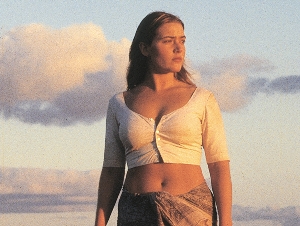
“‘Why do people believe in God? Why do people believe in love? Why do I tell myself every day, ‘You’re fat, mate?'” These age-old questions are the backbone of director Jane Campion’s disorienting fifth feature film. When Ruth Barron (a luminous Kate Winslet) joins up with a guru in India, her concerned family lures her back home to Sydney, Australia, hoping to reclaim her body and soul with some outside help. Enter P. J. Waters, “exit counselor,” a.k.a. religious cult devotee exorcist. Played with balls and heart by Harvey Keitel, his onscreen entrance feels like Winston Wolfe got lost on the way home from Pulp Fiction and wandered into a Jane Campion film. Rest assured he will not exit as he entered. P. J. attempts his three-day de-brainwashing technique on Ruth in an isolated cabin in the outback where their debates on faith quickly devolve (or evolve) into sexual power games. While not without its flaws (may the last two minutes of the film be forgiven and forgotten), Holy Smoke is a disorienting, funny, and rarely-told type of love story. As Fincina Hopgood wrote for Senses of Cinema, ‘‘Romance’ never looked so ridiculous, nor have its power relations been so cruelly exposed.” Cinematographer Dion Beebe (Collateral, Miami Vice) brings a radiant, saturated style to the film while long-time David Lynch composer Angelo Badalamenti fills in between Neil Diamond cuts. (RL)
115 min • Miramax • 35mm from Chicago Film Society collections, permission Park Circus
Film Stock: Fuji (1999) Lab: Deluxe
Cartoon: Popeye in “Never Kick a Woman” (Fleischer Studios, 1936) – 16mm – 7 min
Co-presented with Cine-File Chicago. Introduced by C-F Associate Editor Kat Sachs
Wednesday, September 27 @ 7:30 PM / NEIU
TO EACH HIS OWN
Directed by Mitchell Leisen • 1946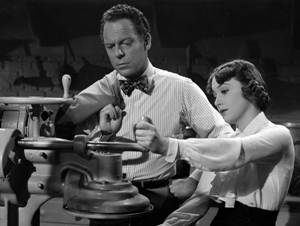
An epic soap opera that resurrected the maternal melodrama from the postwar doldrums, To Each His Own was a self-conscious throwback, closer to the generation-spanning heartbreak of Stella Dallas than the gunfire parenting of Mildred Pierce. Woman’s pic master Mitchell Leisen and screenwriter Charles Brackett fashioned To Each His Own to suit the needs of Olivia de Havilland, returning to the screen after two years’ absence following a contract dispute with Warner Bros. The gambit paid off: de Havilland won a Best Actress Oscar for her portrayal of Jody Norris, a young woman who works in her family’s pharmacy and becomes impregnated by a suave pilot (John Lund) towards the end of World War I. After her lover’s death, Jody arranges for their son to be adopted but remains his protector from afar, securing young Griggsy’s future from her burgeoning cosmetics empire but never managing to buy the boy’s love. Will the grown-up Griggsy (Lund again!) ever appreciate or understand his mysterious benefactor? We can’t say, but we’ll pass along Leisen’s paraphrase of a plea from exhibitors: “Please add a little bit on the end to let people dry their tears. We turn on our lights and the customers are crying so hard they can’t see their way out of the theater.” (KW)
122 min • Paramount Pictures • 35mm from Universal
Film Stock: Eastman (1992)
Cartoon: Popeye in “I Likes Babies and Infinks” (Fleischer Studios, 1937) – 16mm – 7 min
Tuesday, October 3 @ 7:30 PM / NEIU
CANYON PASSAGE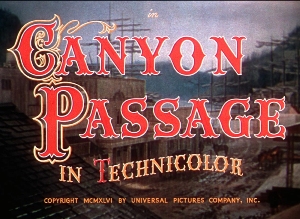
Directed by Jacques Tourneur • 1946
Dana Andrews, his best worst friend (and compulsive gambler) Brian Donlevy, and Susan Hayward star in this bloodcurdling melodrama, set just outside Portland, Oregon, that Eden of the west. Jacques Tourneur’s first color feature is searingly bright, bloody, and vivid, creating a tense, volatile atmosphere well suited to expose the American Myth as a capitalist farce and elegantly weaving multiple storylines and characters. Working across multiple genres throughout his career, Tourneur does for the western what Cat People and I Walked With a Zombie did for the horror film, and the result is nightmarish and deliciously human. Formerly mistaken for one of the many well-intentioned but ultimately humdrum Universal westerns of the ’40s, Canyon Passage has been passionately rescued by the auteurist police, who really got it right this time. The incidental music, courtesy of Hoagy Carmichael, is particularly effective, giving the feeling that you’ve just arrived at a party that’s about to turn into a drunken brawl. With Ward Bond, Lloyd Bridges—and it wouldn’t be a western without Andy Devine. (JA)
92 min • Universal • 35mm from Universal
Film Stock: Eastman LPP (1990)
Cartoon: Porky Pig in “Wagon Heels” (Robert Clampett, 1945) – 16mm – 7 min
Saturday, October 7 @ 11:00 AM
HOME MOVIE DAY 2017
Presented by the Chicago Film Society and Chicago Film Archives.
Chicago History Museum, 1601 N. Clark Street • Free Admission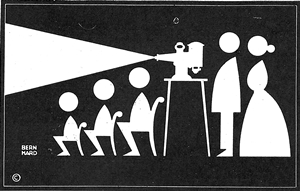
Go down to the basement and dig out your Super 8 memories of that interminable trip to Idaho or that embarrassing 16mm footage of your mother’s rockin’ bat mitzvah and bring them to the Chicago History Museum on Saturday, October 7 for this year’s edition of Home Movie Day. Jointly presented for the seventh year in a row by Chicago Film Archives and the Chicago Film Society, Home Movie Day offers Chicagoans the opportunity to gather together and share their celluloid histories. Home movies provide invaluable records of our families and our communities: they document vanished storefronts, questionable fashions, adorable pets, long-departed loved ones, and neighborhoods-in-transition. Many Chicagoans still possess these old reels, passed down from generation to generation, but lack the projection equipment to view them properly and safely. That’s where Home Movie Day comes in: you bring the films, and we inspect them, project them, and offer tips on storage, preservation, and video transfer–all free of charge. And best of all, you get to watch them with an enthusiastic audience, equally hungry for local history.
Monday, October 9 @ 7:00 PM / Music Box Theatre
SMITHEREENS
Directed by Susan Seidelman • 1982
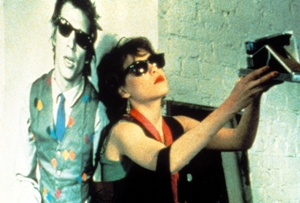 Susan Seidelman’s feature film debut Smithereens is the meaner, younger sister of her cult classic Desperately Seeking Susan. Released three years prior and funded in part by the money Seidelman’s grandmother left her for her “future wedding,” it was shot without permits on the streets of Koch-era New York City (sorry Grandma) and went on to compete at Cannes. Susan Berman stars as Wren, a New Jersey runaway who heads to NYC seeking fame in the punk scene, and whose limited talents include pasting Xeroxed self-portraits of herself around town and pinballing back and forth between sweet (but decidedly NOT punk) Brad Rinn and sexy (real-life punk icon) Richard Hell. Though its main character may have been a ne’er-do-well who showed up late to the cultural moment party, its creator was anything but. Seidelman, in 1982: “My idea was to capture the crazy energy of the rock clubs, the sleazy bars, the tenement lofts. I wanted to people the film with characters who were products of the mass culture of the 1970’s and 80’s, kids who grew up on rock and roll. The design of the film is strongly influenced by cartoons, pop art and the colorful trashiness of New York’s urban landscape.” With a soundtrack soaked in the Feelies, ESG, and the Voidoids and screening in a newly struck 35mm print, this is the New Wave cult film your horrible teenage self should have shoplifted from the video store. (RL)
Susan Seidelman’s feature film debut Smithereens is the meaner, younger sister of her cult classic Desperately Seeking Susan. Released three years prior and funded in part by the money Seidelman’s grandmother left her for her “future wedding,” it was shot without permits on the streets of Koch-era New York City (sorry Grandma) and went on to compete at Cannes. Susan Berman stars as Wren, a New Jersey runaway who heads to NYC seeking fame in the punk scene, and whose limited talents include pasting Xeroxed self-portraits of herself around town and pinballing back and forth between sweet (but decidedly NOT punk) Brad Rinn and sexy (real-life punk icon) Richard Hell. Though its main character may have been a ne’er-do-well who showed up late to the cultural moment party, its creator was anything but. Seidelman, in 1982: “My idea was to capture the crazy energy of the rock clubs, the sleazy bars, the tenement lofts. I wanted to people the film with characters who were products of the mass culture of the 1970’s and 80’s, kids who grew up on rock and roll. The design of the film is strongly influenced by cartoons, pop art and the colorful trashiness of New York’s urban landscape.” With a soundtrack soaked in the Feelies, ESG, and the Voidoids and screening in a newly struck 35mm print, this is the New Wave cult film your horrible teenage self should have shoplifted from the video store. (RL)
89 min • Domestic Productions • 35mm from Westchester Films, Inc.
Film Stock: Kodak 2383 (2016) Lab: Fotokem
Short: “Punking Out” (Maggi Carson, Juliusz Kossakowski, and Fredric A. Shore, 1979) – 16mm – 25 min
“Punking Out” courtesy of the Reserve Film and Video Collection of The New York Public Library for the Performing Arts. “Punking Out” has been preserved with funding from the Carnegie Corporation of New York.
Wednesday, October 11 @ 7:30 PM / NEIU
ONE POTATO, TWO POTATO
Directed by Larry Peerce • 1964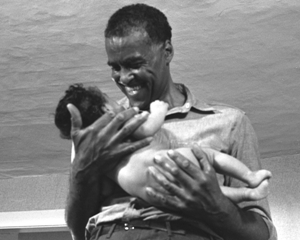
Frank Richards (Bernie Hamilton) and Julie Cullen (Barbara Barrie) would have “an ordinary, everyday, uncomplicated relationship” — if only Frank weren’t black and Julie white. The backlash to their marriage comes to a head when Joe Cullen, Julie’s ex-husband, sues for custody of their daughter Ellen Mary. Frank and Julie chose to create a loving home together, but no matter how good they are to each other and to Ellen Mary, a deadbeat who walked out on his wife and child can still assert the prerogative of white male control and decide if that home is ‘acceptable.’ Shot completely on location in Painesville, Ohio, One Potato, Two Potato was the feature debut of Larry Peerce, a Stella Adler protégé who cut his teeth as a TV director in Cincinnati and would later go on to helm the superlative sociological thriller The Incident. One Potato, Two Potato’s unsparing depiction of what a contemporaneous New York Times review called a “festering problem of our flawed society” won the film accolades at home and abroad, including an Oscar nomination for Best Screenplay and a Best Actress citation for Barrie at Cannes. As an independent production, One Potato, Two Potato assailed American society’s spitefulness towards racially-mixed families with more honesty and directness than Hollywood’s later and less successful attempt to be interracially woke, Guess Who’s Coming to Dinner. (JR)
83 min • Bawalco Picture Company • 35mm from Rialto Pictures
Film Stock: Kodak B+W (1966)
Short: “Cicero March” (The Film Group, 1966) – 16mm – 8 min
Tuesday, October 31 @ 7:30 PM / NEIU
THE SEVENTH VICTIM
Directed by Mark Robson • 1943
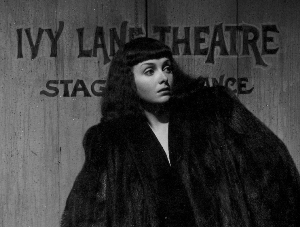 Tasked with heading up RKO’s horror unit from 1942 to 1946, producer and screenwriter Val Lewton was responsible for one of the most extraordinary runs of films to ever come out of classic Hollywood. Given modest budgets, lurid titles, and a running-time cap of 75 minutes by his superiors, Lewton, along with up-and-coming directors Mark Robson, Jacques Tourneur, and Robert Wise, produced a string of bewitching, ethereal masterpieces and developed a house style defined by expressive shadows, pervasive melancholy, somnambulism, and ambient dread. One of Lewton’s crowning achievements, The Seventh Victim broke from horror conventions of its time and found darkness lurking not in the vampires and monsters of the old world but in good ol’ American sham psychoanalytics and success-centered occultism. Having lost contact with her sister Jacqueline (Jean Brooks, emanating fragility), Mary (Kim Hunter in her first screen role) comes to New York City to investigate the mysterious circumstances surrounding Jacqueline’s disappearance and encounters more foreboding darkened passageways and patrician figures of quiet menace than she could’ve possibly bargained for. Deeper, sadder, and more poetic than your typical satanic cult scare picture, The Seventh Victim does what precious few horror films do: preserves its abundant mysteries past its staggering finale. (CW)
Tasked with heading up RKO’s horror unit from 1942 to 1946, producer and screenwriter Val Lewton was responsible for one of the most extraordinary runs of films to ever come out of classic Hollywood. Given modest budgets, lurid titles, and a running-time cap of 75 minutes by his superiors, Lewton, along with up-and-coming directors Mark Robson, Jacques Tourneur, and Robert Wise, produced a string of bewitching, ethereal masterpieces and developed a house style defined by expressive shadows, pervasive melancholy, somnambulism, and ambient dread. One of Lewton’s crowning achievements, The Seventh Victim broke from horror conventions of its time and found darkness lurking not in the vampires and monsters of the old world but in good ol’ American sham psychoanalytics and success-centered occultism. Having lost contact with her sister Jacqueline (Jean Brooks, emanating fragility), Mary (Kim Hunter in her first screen role) comes to New York City to investigate the mysterious circumstances surrounding Jacqueline’s disappearance and encounters more foreboding darkened passageways and patrician figures of quiet menace than she could’ve possibly bargained for. Deeper, sadder, and more poetic than your typical satanic cult scare picture, The Seventh Victim does what precious few horror films do: preserves its abundant mysteries past its staggering finale. (CW)
71 min • RKO Radio Pictures • 35mm from Library of Congress, permission Swank
Cartoon: “Bimbo’s Initiation” (Fleischer Studios, 1931) – 16mm – 7 min
Saturday, November 11 @ Noon / Music Box Theatre
THE LAST MAN ON EARTH
Directed by J.G. Blystone • 1924
Live accompaniment by Dennis Scott, Music Box House Organist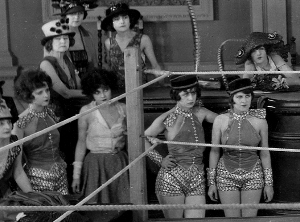
Not to be confused with the post-apocalyptic Vincent Price vs. zombies pic adapted from Richard Matheson’s I Am Legend, the silent version of The Last Man on Earth is a work of speculative science fiction super-charged by festering 19th Amendment anxieties. It’s 1954 and the world has been beset by a global pandemic of masculinitis, a disease that mysteriously kills off all men aged fourteen years and older. Eventually one straggler (Earle Foxe) is discovered in the forest, a tree-dwelling Rip Van Winkle utterly unprepared to become a planetary sex symbol. (His childhood crush once taunted him, saying she wouldn’t marry him if he was the last man on earth. Who’s laughing now?) Foxe is soon set upon by female gangsters, female politicians, female scientists, female everything. The climax even comes down to an extended boxing match between the “Senatoresses” from California and Massachusetts! “The girls really amount to very little, except that there are so many of them,” lamented Variety. “In fact the picture is just a super bathing-girl comedy and would prove a great attraction for the average burlesque houses.” Preserved by The Museum of Modern Art with support from The National Film Preservation Foundation (KW)
70 min • Fox Film Corp • 35mm from the Museum of Modern Art, permission Fox
Film Stock: Kodak (1999)
Cartoon: “It’s the Cats” (Fleischer Studios, 1926) – 7 min, 16mm
Wednesday, November 22 @ 7:30 PM / NEIU
THE TALL TARGET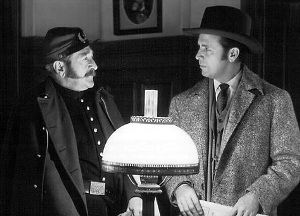
Directed by Anthony Mann • 1951
Based on the Baltimore Plot, an alleged attempt to assassinate President Lincoln days before his inauguration, The Tall Target stars Dick Powell as New York policeman John Kennedy (no relation, really!), who learns of the threat on Lincoln’s life and goes vigilante to save the president-elect on board a train full of Yankees and Rebels traveling on the Night Express from Jersey City to Washington. Eschewing any musical score (unless you count the screeches and wails of the train careening through the night), Anthony Mann creates one of the tensest political thrillers ever, despite the inevitability that the Tall Target won’t die this time. A modest financial failure on its initial release, The Tall Target presents a perennially relevant microcosm of Americans against Americans. With wiley Adolphe Menjou as the very corrupt Colonel Caleb Jeffers, Marshall Thompson as a pistol-slinging Confederate, and Ruby Dee in one of her earliest roles. (JA)
78 min • Metro-Goldwyn-Mayer • 35mm from Warner Bros.
Film Stock: Eastman (1961), some sections AGFA
Cartoon: “Porky’s Railroad” (Frank Tashlin, 1937) – 16mm – 7 min
Monday, Nov 27 – 7:00PM / Music Box Theatre
DICK TRACY
Directed by Warren Beatty • 1990
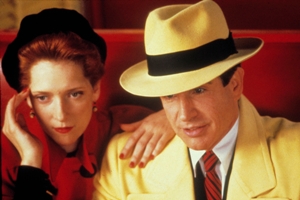 If Beetlejuice can step into the cap and cowl of the Dark Knight, why can’t John Reed play Chester Gould’s comic strip crime-stopper? A long-gestating project (Alain Resnais was briefly attached to direct) that finally hit theaters after Tim Burton’s Batman had fatally altered the blockbuster paradigm, Dick Tracy was the first film to gross $100 million and still be judged a flop. Revisited today, it’s a romantic, auteur-driven take on the comic book movie, and the road not traveled for an increasingly bottom-line-obsessed genre. While Marvel and DC efforts are forever teasing the next chapter in their cinematic universes, Dick Tracy crams in so many incidents and villains (Itchy! 88 Keys! The Rodent! Flattop! Pruneface! Dustin Hoffman as Mumbles! Al Pacino, an Oscar nominee, as Big Boy Caprice!) as to make a sequel unfathomable and mildly nausea-inducing. And no subsequent comic book movie has been as invested in working within the parameters of its four-color source material, faithfully recreated and deliriously explored through Richard Sylbert’s production design and Vittorio Storaro’s cinematography. For all the pyrotechnics, though, it’s mostly an emotionally direct, stirringly simple movie about Dick Tracy fitfully trying to be a better boyfriend. With songs by Stephen Sondheim, singing by Madonna, and spittle-flecked mugging from everyone else. (KW)
If Beetlejuice can step into the cap and cowl of the Dark Knight, why can’t John Reed play Chester Gould’s comic strip crime-stopper? A long-gestating project (Alain Resnais was briefly attached to direct) that finally hit theaters after Tim Burton’s Batman had fatally altered the blockbuster paradigm, Dick Tracy was the first film to gross $100 million and still be judged a flop. Revisited today, it’s a romantic, auteur-driven take on the comic book movie, and the road not traveled for an increasingly bottom-line-obsessed genre. While Marvel and DC efforts are forever teasing the next chapter in their cinematic universes, Dick Tracy crams in so many incidents and villains (Itchy! 88 Keys! The Rodent! Flattop! Pruneface! Dustin Hoffman as Mumbles! Al Pacino, an Oscar nominee, as Big Boy Caprice!) as to make a sequel unfathomable and mildly nausea-inducing. And no subsequent comic book movie has been as invested in working within the parameters of its four-color source material, faithfully recreated and deliriously explored through Richard Sylbert’s production design and Vittorio Storaro’s cinematography. For all the pyrotechnics, though, it’s mostly an emotionally direct, stirringly simple movie about Dick Tracy fitfully trying to be a better boyfriend. With songs by Stephen Sondheim, singing by Madonna, and spittle-flecked mugging from everyone else. (KW)
105 min • Touchstone Pictures • 35mm from Chicago Film Society collections, permission Swank
Cartoon: Roger Rabbit in “Roller Coaster Rabbit” (Frank Marshall and Rob Minkoff, 1990) – 35mm – 7 min
Wednesday, November 29 @ 7:30 PM / NEIU
IT’S GREAT TO BE ALIVE
Directed by Alfred Werker • 1933
A musical remake of The Last Man on Earth 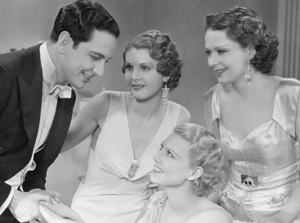 produced during the lascivious pre-Code era, It’s Great To Be Alive hardly stints on the racy implications of its premise. Brazilian crooner Raul Roulien stars as the last surviving XY specimen, a dashing aviator who accidentally missed the masculinitis epidemic by pouting the years away on a remote island after being teased once too often by gal pal Gloria Stuart. And his discovery couldn’t come at a better time—Edna May Oliver’s efforts to create a Synthetic Man in her laboratory have run aground. After treating Roulien to a ticker-tape parade, the women of the world compete for his affections through a dance showcase. Cuba, Czechoslovakia, and the Netherlands—show us what you’ve got! One of a seemingly endless roster of neglected Fox musicals, It’s Great To Be Alive features a handful of numbers from forgotten composer William Kernell, including “I’ll Build a Nest” and “Good Bye, Ladies.” Fox had hoped to build up Roulien as a major star, but alas, his third-billed role in RKO’s Flying Down to Rio later that year hardly helped; his planned breakthrough was overshadowed by fourth- and fifth-billed Ginger Rogers and Fred Astaire. Though his career in movies proved too short, Roulien himself never fell victim to masculinitis: he lived to be 94! Preserved by The Museum of Modern Art with support from the Celeste Bartos Fund for Film Preservation.(KW)
produced during the lascivious pre-Code era, It’s Great To Be Alive hardly stints on the racy implications of its premise. Brazilian crooner Raul Roulien stars as the last surviving XY specimen, a dashing aviator who accidentally missed the masculinitis epidemic by pouting the years away on a remote island after being teased once too often by gal pal Gloria Stuart. And his discovery couldn’t come at a better time—Edna May Oliver’s efforts to create a Synthetic Man in her laboratory have run aground. After treating Roulien to a ticker-tape parade, the women of the world compete for his affections through a dance showcase. Cuba, Czechoslovakia, and the Netherlands—show us what you’ve got! One of a seemingly endless roster of neglected Fox musicals, It’s Great To Be Alive features a handful of numbers from forgotten composer William Kernell, including “I’ll Build a Nest” and “Good Bye, Ladies.” Fox had hoped to build up Roulien as a major star, but alas, his third-billed role in RKO’s Flying Down to Rio later that year hardly helped; his planned breakthrough was overshadowed by fourth- and fifth-billed Ginger Rogers and Fred Astaire. Though his career in movies proved too short, Roulien himself never fell victim to masculinitis: he lived to be 94! Preserved by The Museum of Modern Art with support from the Celeste Bartos Fund for Film Preservation.(KW)
69 min • Fox Film Corp • 35mm from the Museum of Modern Art, permission Criterion Pictures
Film Stock: Unmarked B+W Polyester
Cartoon: “Any Little Girl That’s a Nice Little Girl” (Fleischer Studios, 1931) – 16mm – 7 min
45th Anniversary of the Memory Club Special Event with an Appearance from Chuck Schaden
Tuesday, December 5 @ 7:30 PM / NEIU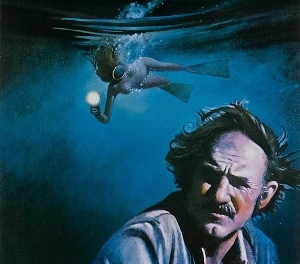
NIGHT MOVES
Directed by Arthur Penn • 1975
Sam Spade he is not, but when an aging former actress hires private eye Harry Moseby to find her missing teenage daughter Delly he plunges head-first down the rabbit hole. Gene Hackman (as Moseby) leads the cast in Arthur Penn’s melancholy tropical noir, which includes fantastic early performances by both 17-year-old Melanie Griffith (in her first credited role) as Delly and James Woods as Quentin, Delly’s ex and a Hollywood stunt-vehicle mechanic. When Moseby finds her in the Florida Keys with her stepfather (John Crawford) and his girlfriend (a magnetic Jennifer Warren), a body is discovered in the water; the plot thickens, and thickens some more. Attempting to navigate the twists and turns while keeping your head above water is both part of the joy and part of the horror of Night Moves. A woozy post-Watergate deathtrip made at a time when, in the director’s own words, “We were wandering around in a kind of blindness…I thought we should tell this detective story in a way that could only be understood by what we see, not by what we are told.” Penned with dexterity by Alan Sharp (The Hired Hand, Ulzana’s Raid), Night Moves has gained a reputation as both a ’70s classic and one of Penn’s finest films. (RL)
99 min • Warner Bros. • 35mm from Warner Bros.
Film Stock: Kodak 2383 (2002)
Short: Dragnet: “The Big Setup” (Jack Webb, 1956) – 35mm – 30 min
RE-SCHEDULED!
Monday, December 11 @ 7:30 PM / NEIU
MONTE CARLO: THE SILENT VERSION
Directed by Ernst Lubitsch • 1930
Live organ accompaniment by Jay Warren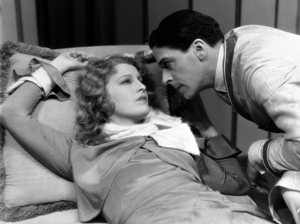
Crack open any film history textbook and you’ll likely find an extended description of a sequence in Monte Carlo: runaway bride Jeanette MacDonald reclines in a train car and belts out “Beyond the Blue Horizon” with the clang of the engine and the whir of the wheels providing the syncopation. When placed beside the mumbly milestones of the very earliest talkies like The Jazz Singer and The Lights of New York, this simple production number in Monte Carlo looked like a quantum leap and pointed the way towards the creative application of sound technology. And yet this musical chestnut was also distributed mute in the waning days of the silent era, offered to theaters that had not yet been wired for sound. The plot—penniless countess MacDonald flees her wedding for Monte Carlo, where she hopes to gamble her way to financial stability but winds up instead with a count (Jack Buchanan) whom she mistakes for a hairdresser—follows the sound version, but clocks in twenty minutes shorter without all the songs. Discovered among reels of nitrate at the Paramount Pictures lot, the silent version of Monte Carlo was one of dozens of films donated to the American Film Institute in 1968 through the efforts of the late archivist David Shepard. (KW)
71 min • Paramount Pictures • 35mm from Library of Congress, permission Universal
Film Stock: Orwo
Short: Fractured Flickers: “Pilot Episode” (Jay Ward Productions, 1961) – 16mm – 24 min
Special Thanks: Shayne Pepper, Michael Hines, Richard Helldobler, Kyle Burke, Cyndi Moran, Robert Ritsema, Ernie Kimlin, Chris Rodriguez, Tom Scanlon, and Erin Dennis of Northeastern Illinois University; Randy Andrews of Swank Motion Pictures; Brian Andreotti and Ryan Oestreich of the Music Box Theatre; David Antos & Chris Omiotek; Mark Balsam of Westchester Films, Inc.; Andrea Benveniste of 20th Century Fox; James Bond of Full Aperture Systems; Dennis Chong, Jesse Chow, and Eric Chin of Universal; Chris Chouinard of Park Circus; Neil Cooper; Steve Darnall; Justin Dean; Justin Dennis of Kinora; Eric di Bernardo and Dave Franklin of Rialto Pictures; Amanda El-Khoury & Chaclyn Hunt; Bill Francik; Amélie Garin-Davet of Cultural Services of the French Ministry; Katherine Greenleaf; Cary Haber of Criterion Pictures, USA; Louis Irmo of First Nonprofit Insurance; David Jennings of Sony Pictures Repertory; James Layton, Katie Trainor, and Dave Kehr of the Museum of Modern Art; Steven Lloyd; Steven Lucy; Bob Morrissey; Nicole Woods and Kristie Nakamura of Warner Bros. Classics; Jacob Perlin and Max Bienstock of the Metrograph; Mike Quintero; Julia Reinitz; Kate Rouhandeh and Michael Pearson of Cinefamily; Dennis Scott; Elena Rossi-Snook and Dave Callahan of the New York Public Library Reserve Film and Video Collection; Neal Sabin; Chuck Schaden; Lynanne Schweighofer, Rob Stone, and Mike Mashon of the Library of Congress; Joe Swanberg; Kiyan Warner; Nancy Watrous, Brian Belak, and Michelle Puetz of Chicago Film Archives; Dennis Wolkowicz and Jay Warren
And extra special thanks to our audience, who make it all possible!
